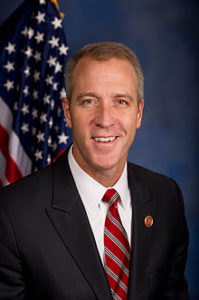Maloney Opposes Partisan Farm Bill, Leads Final Charge to Make Popular Improvements
WASHINGTON — Representative Sean Patrick Maloney (NY-18) voted against the Republican Farm Bill today, objecting to a wide variety of cuts and programmatic changes which failed to adequately address the needs of Hudson Valley Farmers. H.R. 2, the Agriculture and Nutrition Act of 2018, also known as the 2018 Farm Bill reauthorizes and amends all programs directed by the United States Department of Agriculture (USDA). The Farm Bill is typically passed with broad, bipartisan support every five years. Rep. Maloney also led the final effort by Democrats to make bipartisan improvements to the bill which would be beneficial to Hudson Valley farmers and rural communities. The bill ultimately failed to pass on a vote of 198-213.
“I was proud to be part of the bipartisan team that wrote the last version of the Farm Bill in 2014. But we almost followed the best-ever Farm Bill for the Hudson Valley with the worst-ever Farm Bill for the Hudson Valley,” said Rep. Maloney, a member of the House Committee on Agriculture. “Just a couple days ago we got hit with storms that destroyed acres and acres of crops. Days later, the U.S. Congress proposed to respond to millions of dollars in crop losses with billions of dollars in crop insurance cuts. That’s a kick in the teeth to every farmer I represent. But it doesn’t stop at crop insurance – this version of the bill would have eliminated America’s largest conservation program and done too little to help small, diverse family farms. It wouldn’t have added a penny to the very research foundation that’s funding our local efforts to fight the Allium leafminer and it didn’t invest enough in efforts to support young and beginning farmers. It also went after folks who rely on SNAP. This thing was a raw deal all around and there’s just no way I could have supported it.”
Rep. Maloney secured a litany of key priorities for the Hudson Valley in the 2014 version of the Farm Bill, which received broad bipartisan support. Rep. Maloney has served the Hudson Valley on the Committee on Agriculture since being elected to Congress in 2013. In October 2017, Rep. Maloney met with his Agriculture Advisory Board to plan his priorities for the 2018 Farm Bill. He also met with local hunger experts in February, 2018, as much of the Farm Bill focuses on the provision of nutrition assistance.
Some of Representative Maloney’s greatest concerns with the partisan 2018 Farm Bill include:
Crop Insurance – The bill provided $12 billion less in funding for the essential crop insurance program than what was provided in the 2014 version of the Farm Bill. Farmers reeling from this week’s deadly storms will rely on the program to recoup crop losses.
Specialty Crops – The legislation would eliminate an accountability requirement included in the 2014 Farm Bill which improved outreach to specialty crop growers – like apple and onion farmers in the Hudson Valley. It also eliminates the Technical Assistance for Specialty Crops Program and rolls its mandates into a new market development program with three other existing programs. It repeals the Export Assistance for Specialty Crops program, which helps specialty crop growers sell their products overseas.
Young and Beginning farmers – Funding for the Beginning Farmer and Rancher Development Program (BFRDP) would have been frozen at 2014 levels even though the average age of farmers continues to rise and too few new farmers are joining the industry. The bill also fails to permanently reauthorize the BFRPD, a bipartisan priority.
Research – The bill failed to provide any new funding for the Foundation for Food and Agriculture Research (FFAR), a public-private partnership which invests in agriculture research. In the Hudson Valley, an FFAR-funded research project to combat the Allium leafminer is currently underway. The leafminer is an invasive species of pest which threatens Orange County’s multimillion dollar annual onion crop.
Conservation – This Farm Bill would have eliminated America’s largest conservation program, the Conservation Stewardship Program (CSP). The program’s existing mandates would be rolled into the Environmental Quality Incentives Program, which would effectively cut conservation funding by $5 billion.
SNAP – The bill included billions of dollars in cuts when compared with the 2014 version of the Farm Bill. Congressional Budget Office (CBO) estimates indicated that participation in the program would drop by millions over the next ten years had the bill passed.

